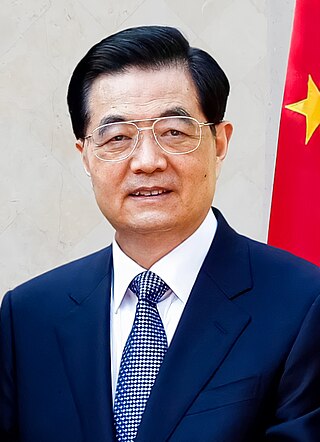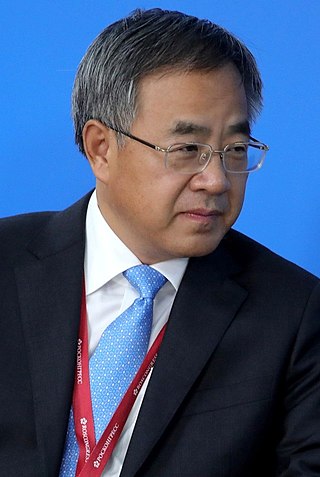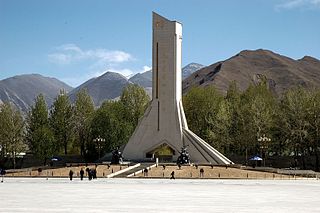Related Research Articles

Hu Yaobang was a high-ranking official of the People's Republic of China. He held the top office of the Chinese Communist Party (CCP) from 1981 to 1987, first as Chairman from 1981 to 1982, then as General Secretary from 1982 to 1987. Hu joined the CCP in the 1930s, and rose to prominence as a comrade of Deng Xiaoping. During the Cultural Revolution (1966–1976), Hu was purged, recalled, and purged again by Mao Zedong.

Hu Jintao is a Chinese politician who served as the general secretary of the Chinese Communist Party (CCP) from 2002 to 2012, the president of China from 2003 to 2013, and chairman of the Central Military Commission (CMC) from 2004 to 2012. He was a member of the CCP Politburo Standing Committee, China's de facto top decision-making body, from 1992 to 2012. Hu was the paramount leader of China from 2002 to 2012.
The People's Republic of China (PRC) became more influential economically in the 1990s and 2000s and was beginning to be widely recognized as an emerging superpower. In 2010, China became the world's second largest economy by nominal GDP and became the largest economy since 2014 measured by GDP PPP surpassing the United States which previously held that position. At the same time, numerous social problems emerged and intensified. As CCP General Secretary Jiang Zemin, Congress Chairman Li Peng and Chinese Premier Zhu Rongji, gradually retired from their position of power, "fourth-generation" leaders, led by CCP General Secretary Hu Jintao and Premier Wen Jiabao, faced with increasing social unrest, attempted to steer the country towards a new direction. From the path of focusing solely on economic development, Hu and Wen placed focus on creating an overall balance under the idea of the Scientific Outlook on Development to create a socialist harmonious society. In this process, there was an unprecedented shift in stance towards favouring rural development and farmers, as well as other generally populist policies. The Hu-Wen government, on the same token, attempted to restrict some personal freedoms, especially those associated with political content on the Internet.

The Constitutional Act of the Realm of Denmark, also known as the Constitutional Act of the Kingdom of Denmark, or simply the Constitution, is the constitution of the Kingdom of Denmark, applying equally in the Realm of Denmark: Denmark proper, Greenland and the Faroe Islands. The first democratic constitution was adopted in 1849, replacing the 1665 absolutist constitution. The current constitution is from 1953. It is one of the oldest constitutions in the world. The Constitutional Act has been changed a few times. The wording is general enough to still apply today.

Hu Jia is a Chinese civil rights activist and noted critic of Chinese Communist Party. His work has focused on the Chinese democracy movement, Chinese environmentalist movement, and HIV/AIDS in the People's Republic of China. Hu is the director of June Fourth Heritage & Culture Association, and he has been involved with AIDS advocacy as the executive director of the Beijing Aizhixing Institute of Health Education and as one of the founders of the non-governmental organization Loving Source. He has also been involved in work to protect the endangered Tibetan antelope. For his activism, Hu has received awards from several European bodies, such as the Paris City Council and the European Parliament, which awarded the Sakharov Prize for Freedom of Thought to him in December 2008.

Hu Chunhua is a Chinese politician, a former member of the Politburo of the Chinese Communist Party (CCP), and a Vice Premier of the People's Republic of China in Premier Li Keqiang's Cabinet. He worked in Tibet for much of his career and ascended the party ranks partly through the Communist Youth League. He is popularly known as "little Hu" due to the similarities of his career with that of former CCP General Secretary Hu Jintao. He became China's youngest governor when he took the position in Hebei province in 2008. He was then promoted to Communist Party secretary of Inner Mongolia in 2009. In 2012, he was named Communist Party secretary of Guangdong and entered the CCP Politburo.
This is a list of topics related to Tibet.

Tenzin Tsundue is a poet, writer and Tibetan refugee and activist. As of 2019 he has been taken into preventive custody, arrested or jailed 16 times for short durations for his activism by Indian authorities. When he was 22, he travelled to Tibet. However, he was arrested and sent back to India, "They told me I was born in India and so I did not belong to Tibet."

The 2008 Tibetan unrest, also referred to as the 2008 Tibetan uprising in Tibetan media, was a series of protests and demonstrations over the Chinese government's treatment and persecution of Tibetans. Protests in Lhasa, the capital of Tibet, by monks and nuns on 10 March have been viewed as the start of the demonstrations. Numerous peaceful protests and demonstrations were held to commemorate the 49th anniversary of the 1959 Tibetan Uprising Day, when the 14th Dalai Lama escaped from Tibet. The protests and demonstrations spread spontaneously to a number of monasteries and throughout the Tibetan plateau, including into counties located outside the designated Tibet Autonomous Region. The arrest of monks at Labrang Monastery increased the tension of the situation. Violence began when Chinese police and People's Liberation Army units used force on non-violent protests by monks and nuns, and spread when protesting Tibetans later clashed with security forces. Clashes also occurred between Tibetans and Chinese Han and Hui residents, resulting in Han and Hui stores and buildings being destroyed and numerous Chinese civilians being injured or killed.
The 1987–1989 Tibetan unrest was a series of protests and demonstrations that called for Tibetan independence. These protests took place between September 1987 and March 1989 in the Tibet Autonomous Region, in the Tibetan regions of Sichuan, and Qinghai, as well as the Tibetan prefectures in Yunnan and Gansu. Protests began shortly after the Dalai Lama, the religious and temporal leader of Tibet exiled in India since the 1959 Tibetan unrest, proposed a Five Point Peace Plan regarding the “status of Tibet” on September 21, 1987, which was subsequently rejected by the Chinese government. The Plan advocated for greater respect and autonomy of the Tibetan people, and claimed that “Tibet was a fully independent state when the People’s Liberation Army invaded the country in 1949-50.” China rejected the idea of Tibetans as an invaded people, stating that “Tibet is an inalienable part of Chinese territory” and has been for hundreds of years. The Tibetan sovereignty debate is longstanding, and the Tibetan assertion that they are a separate and unique people invaded by China has become a central argument for their independence.

Inger Støjberg is a Danish politician, businesswoman and former reporter who served as a government minister in the Danish Parliament.
The 2008 Tibetan unrest was a series of protests and demonstrations, met by excessive force, focused on the persecution of Tibetans in the buildup to the 2008 Summer Olympics in Beijing. There was a mixture of outrage and understanding from leading figures abroad.

Protests and uprisings in Tibet against the government of the People's Republic of China have occurred since 1950, and include the 1959 uprising, the 2008 uprising, and the subsequent self-immolation protests.

The Monument to the Peaceful Liberation of Tibet stands in the southern part of the Potala square in Lhasa, Tibet Autonomous Region just outside the protective zone and buffer zone of the World Heritage Site. It celebrates what the People's Republic of China calls the Peaceful Liberation of Tibet by the People's Liberation Army, or what the exiled Tibetan government calls the invasion and annexation of Tibet. The foundation stone was laid on July 18, 2001 by Hu Jintao, China's vice-president at the time. The monument was unveiled on May 22, 2002.

The 2012 BRICS summit was the fourth annual BRICS summit, an international relations conference attended by the heads of state or heads of government of the five member states Brazil, Russia, India, China and South Africa. The summit was held at Taj Hotel in New Delhi, India on 29 March 2012 and began at 10:00 Indian Standard Time. This is the first time that India has hosted a BRICS summit. The theme of the summit was "BRICS Partnership for Global Stability, Security and Prosperity".
The Tibet flag case concerns police action taken in relation to two demonstrations in Copenhagen, Denmark, in 2012 and 2013 against former Chinese Communist Party general secretary Hu Jintao's state visit. It is named after the confiscation or concealment of Tibetan flags that were used as part of the demonstrations.

Antireligious campaigns in China refer to the Chinese Communist Party's official promotion of state atheism, coupled with its persecution of people with spiritual or religious beliefs, in the People's Republic of China. Antireligious campaigns were launched in 1949, after the Chinese Communist Revolution, and they continue to be waged against Buddhists, Christians, Muslims, and members of other religious communities in the 21st century. State campaigns against religion have escalated since Xi Jinping became General Secretary of the Chinese Communist Party on November 15, 2012. For Christians, government decrees have mandated the widespread removal of crosses from churches, and in some cases, they have also mandated the destruction of houses of worship, such as the Catholic Three Rivers Church in the city of Wenzhou. In Tibet, similar decrees have mandated the destruction of Tibetan Buddhist monastic centers, the destruction of sacred Buddhist sites, the destruction of monastic residences, the denial of the Tibetan people's right to freely access their cultural heritage, the ongoing persecution of high Buddhist lamas and the ongoing persecution of Buddhist nuns and monks. Reports which document the existence of forced re-education camps, arrests, beatings, rape, and the destruction of religious sites in Tibet are also being published with regard to the Uyghur people, who are being subjected to an ongoing genocide.
The Court of Impeachment of the Realm is a special court of the Kingdom of Denmark, that the Danish Parliament can assemble, to hear and deliver judgments against ministers accused of unlawful misconduct and maladministration of office. According to the wording of the Constitutional Act, the Queen can also demand that Ministers be impeached and brought before the Court of Impeachment. However, in practice only Government has this right.
Events in the year 2022 in Denmark.
The Denmark Democrats, officially Danmarksdemokraterne – Inger Støjberg, is a Danish political party founded in June 2022 by Inger Støjberg. In the 2022 election, the Denmark Democrats won 14 seats, thereby making them the 5th largest party alongside Liberal Alliance in the Folketing.
References
- ↑ "Mystery of lost US nuclear bomb". 2008-11-10. Retrieved 2022-12-27.
- ↑ "Tamilsagen genfortalt: Dengang en bunke syltede sager væltede en hel regering". Altinget.dk (in Danish). Retrieved 2022-12-27.
- ↑ "Danish watchdog to investigate police suppression of Tibet national flag". thetibetpost.com. Archived from the original on 9 August 2016. Retrieved 2017-05-17.
The police bureau in the Danish capital, Copenhagen, has asked its watchdog to investigate officers' alleged suppression of protesters holding the national flag of Tibet during former Chinese President Hu Jintao's state visit three years ago. The Copenhagen Police will face a formal inquiry by the Independent Police Complaints Authority after its explanation of the 2012 event raised doubts, Danish newspaper "The Local" reported.
- ↑ Rhodes, Aaron (2014-04-12). "How Europe Sacrificed the Right to Peaceful Protest for Good Relations With China". Huffington Post. Archived from the original on 17 April 2014. Retrieved 2017-05-17.
The detention and removal of pro-Tibetan protestors and the confiscation of Tibetan flags was also part of the modus operandi of the Danish police when former president Hu Jintao visited Copenhagen in June 2012. While peacefully waving Tibetan flags, protestors were ordered to leave Parliament Square, and videos show Danish police officers confiscating Tibetan flags. Another incident saw an individual detained by three police officers in a public park close to a castle that was to be visited by Hu Jintao. Danish courts found that the sole reason for the detention was that the protester had been in possession of a Tibetan flag.
- ↑ Szumski, Charles (5 October 2022). "Danish PM called snap elections following mink-gate scandal". Euractiv .
- ↑ "Rigsretten - Rigsretten har afsagt dom i sagen mod fhv. minister Inger Støjberg". rigsretten.dk (in Danish). Retrieved 2021-12-13.
- ↑ Berry, Alex (30 May 2021). "Danish secret service helped US spy on Germany's Angela Merkel: report". Deutsche Welle . Retrieved 1 June 2021.